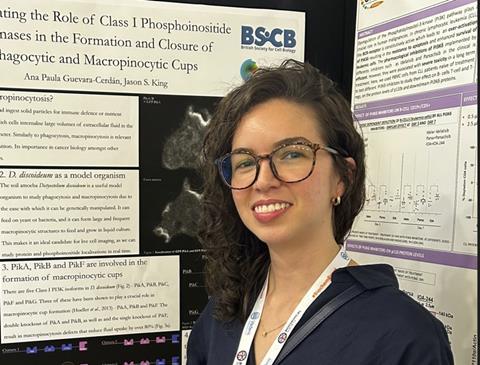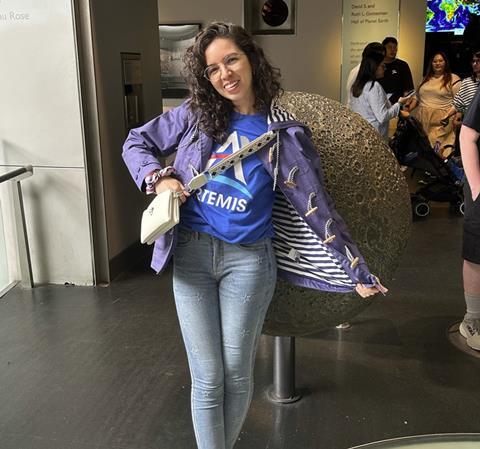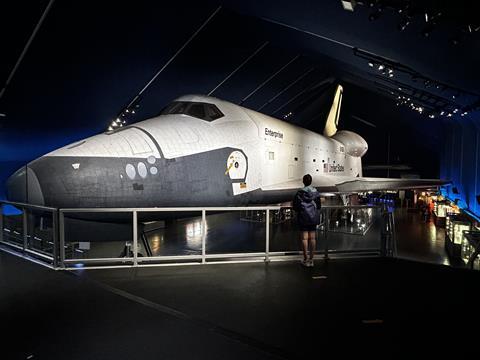Microbiology PhD student Ana Paula Guevara-Cerdán has struggled with ADHD all her life without knowing it - but her diagnosis earlier this year transformed her life in the lab, as she tells The Microbiologist during ADHD Awareness Month.
“It had been a full month since I’d returned to the lab after spending Christmas in Mexico, and I knew something wasn’t right. On my first day back, I’d gone to get fresh cells from liquid nitrogen but I was now unable to use them, as they were too old to do experiments with,” the University of Sheffield PhD student says.

“All of January 2023 I experienced what I can only describe as complete paralysis. I knew exactly what I needed to do, I’d discussed it all with my supervisor too, but I simply could not get started. I’d sit at my desk for days, unable to walk into the lab because the idea of getting started with my experiments was too daunting.
“This is what made me type ‘ADHD symptoms in adults’ into Google after reading a review for a time management app, where someone explained how the app helped them because their ADHD made them lose track of time and procrastinate never-endingly.”
Instagram story
The 27-year-old has charted her progress since diagnosis on February 23 in an Instagram account called My PhD With ADHD. She is now more than halfway through the third year of her four-year PhD in Molecular and Cellular Biology at the University of Sheffield.
“My research looks into the roles of phosphoinositide 3-kinase (PI3K) isoforms in the formation and closure of phagocytic and macropinocytic cups in Dictyostelium discoideum,” she says.
“However, my interests in PI3K signalling go way beyond that - to outer space, to be precise. My goal is to work in space medicine research, for which I’m slowly but surely taking small steps towards. This past summer, my supervisor let me host an undergraduate student in the lab to study phagocytosis and macropinocytosis in simulated microgravity conditions. For this we built a microgravity simulator known as a clinostat from scratch, as per Herrera-Jordan et al., 2021.”
Exam struggle
But if she had listened to her school careers advisor, she wouldn’t have been doing a PhD at all.
“I always knew there was something funny because in sixth form and university I really struggled with exams and I felt like the grades never reflected the knowledge and understanding I knew I had.. This happens a lot to me - when I find the task very daunting, I freeze, I can’t do anything. So I would stare at my exam paper for about half an hour and then I’d be like, okay, let’s do this. Inevitably I would always hand in the exam papers half-answered. I knew the freezing was an issue, but I never really told anyone. I was just like, yeah, I need extra time because I do, that’s just me,” she says.
“I did very well in my A level physics coursework - just like at university, coursework in school was always what rescued my grades. I remember I had to design a research project and I built a little figure skater using a bicycle pedal to study angular momentum. That was really fun,” she says.

“So at university, the same thing would happen - I would get really good results from my research projects and essays, but then my exam grades would never stand out. But I just kind of accepted that was who I was and I kept going.
“I ended up landing two PhD offers - I still made it. So I never asked whether I was capable. I just knew I had gone about it in a funny way, and I knew I wasn’t the same as my peers.”
Ticking clock
But it was only in the third year of her PhD that things came to a head.
“This paralysis wasn’t just for an hour or so - this time it lasted an entire month,” she says.
“So I woke my cells up from liquid nitrogen, and then the clock started ticking. I work on amoebae as a model organism and they develop mutations if you culture them for longer than a month, so to trust your results you need to work with them within four weeks from waking them up.
“So they didn’t die, but I just couldn’t work with them anymore. And my PI was like, did you do that experiment we discussed? And I was like, Sorry, I didn’t do the experiment and I can’t actually tell you what I’ve done for a month. I’ve sat at my desk staring at my computer.”
Masking symptoms
By then, fortunately she had begun to get an inkling of what was going on and had told her therapist in Mexico about her suspicion that something was up.
“I think I’d been really good at masking because she had known me for two years and when I first mentioned it she didn’t think I had ADHD,” she says.
“I had to really explain my symptoms and expose the inside of my brain, like, those feelings and thoughts that only you know you have. And once I told her everything, she did believe I had it. So she referred me to a psychiatrist in Mexico, and I had an assessment over Zoom within days, where I was officially diagnosed.”
Shared care
Adult ADHD can be difficult to get diagnosed and treated in the UK, but Ana Paula’s GP agreed to accept a shared care agreement with a UK-based specialist online service because they held the required certifications.
“I went ahead, paid for my appointment and I got diagnosed in the UK,” she says. “I remember it was February 23 so it only took just over three weeks after first bringing it up with my therapist. Two of those weeks I spent crying because I thought I wouldn’t be able to get treatment in the UK, so it felt like a very long process, but it really wasn’t. I feel really lucky to have gotten through it so quickly.”
While her PI was initially less than impressed with the lack of progress with the cells, he was supportive when he learned that ADHD could be involved.
“He reacted very nicely and just said, What can I do to help you? Let’s work at it together. And I know from the experience of other people, that some PIs don’t understand what ADHD is. One of my closest friends right now is really struggling with her productivity. And her PI was recently just like, well, you need to do more, I don’t care, you just need to do more. And that’s not the way to approach the situation when somebody feels paralysis.“
Start of medication
Ana Paula says that when she first started taking ADHD medication, it was set at the lowest dose and she was told not to expect any effect.
“But the first day I was just like, oh, I want to get things done - I just really wanted to do lab work. I remember that day - everything was so easy in the lab,
“Before that, just getting out from the office and going into the lab was such a heavy weight, like I really had to talk myself there and convince myself to go pour some agar plates, which really shouldn’t be an overwhelming task. This is executive dysfunction perfectly exemplified. But that first day on medication I remember pouring plates and doing experiments with ease, and at the end of the day, I was like, Whoa, I really shouldn’t have felt any of that today. That’s amazing.

“But on the first day that I increased my dose for the next stage of titration, I had a horrible headache and I couldn’t eat anything because of how nauseous I felt,” she says.
“I sat at my desk all day feeling very jittery - I went back down to the lowest dose the following day and I’ve stayed at that dose ever since. My titration process was pretty straightforward.”
Hyperfocus and science
While most of Ana Paula’s experiences with ADHD have been negative, she does admit the hyperfocus aspect can lend itself to a career in science.
“The thing is, if I find something boring, or if it doesn’t work for my brain, I really struggle with it - like exams,” she says.
“But on the opposite side, if I find something fascinating, I’m way too involved. I would like to go into space medicine research and so I’ve gotten involved with NASA GeneLab - I’ve contributed to two publications to date, and now through them, I have been granted funding to attend the American Society for Gravitational and Space Research Conference.

“So I think my strength is that if I find something I love, I’m fully invested, and in the case of space medicine, I can do work beyond my PhD towards that.
“There’s a dark side to it because I do burn myself out, so I’m learning how to find balance. I’m learning how to look after my mental and physical health, as well as allowing myself to be fully invested in my work because hopefully, that will take me somewhere.”
Working with neurodiversity
Ana Paula hopes that other PhD supervisors will work with their students who have ADHD and understand how broad the symptoms can be.
“ADHD is not just a screaming kid or a little kid who interrupts their parents’ conversations all the time,” she says.
“In PhD students it’s very likely that it doesn’t look like that and it’s more about motivation and executive function. I think a PhD is all about self drive - nobody tells you to show up at 9am. Before my diagnosis, I didn’t understand why I couldn’t have a normal breakfast, where I would just eat my breakfast in 10 minutes and get out of the house. I would often sit at my kitchen table for four hours and I didn’t understand where the time went.
“If supervisors are observing a lack of motivation and time management, it could also be affecting their students’ health because they may not be eating well, taking breaks or even going to the bathroom when they’re busy.
Time management
“I feel like the nature of a PhD is exactly what ADHDers struggle with - especially time management because nobody tells us what time to go in or what time to leave. I now often go in at a normal time and can’t get myself out of the lab before seven or eight at night, which is ridiculous and something I’m working on.
“So time management on the day to day is really difficult, but also the project timeline - you don’t have a deadline until your thesis.”
She advises supervisors to keep checking in regularly with their ADHD students to keep them on schedule: “For me it works if it’s every two weeks because I can plan the experiments and be left alone to do them, but I know that there is somebody holding me accountable.
“And also, just understanding that it’s not that we don’t want to do it - it’s something inside us. It’s like such a heavy feeling of paralysis. I just get frozen in my chair and I can’t go and do it, but I really want to do that experiment, I promise you.
Support from colleagues
“Today I had to run this really complicated PCR and the postdoc in my lab knew that I had been trying to do it for three days and I was doing all kinds of things to procrastinate on it.
So this morning, he was like, What can I do? Let’s go and do it together if you want. And he kept reminding me throughout the day ‘Have you done it? Come on, you can do it, I believe in you.’
“And then I finally went and did it. So it’s nice for people to be aware that I’m struggling with something because I’m overwhelmed, and them not being judgy but being supportive instead, and finding ways to help me and push me.”
Career path
Over the years, Ana Paula was told by teachers and careers advisors not to choose science, not to apply for a PhD, not to apply for Russell Group universities - and ignored all of it.
“They assume that you’re never going to go far. But from a young age I haven’t taken no for an answer,” she says.
“People with ADHD can go as far as they wish, especially if they receive the correct diagnosis and treatment. I think our strength can be the ability to be laser focused and make things happen. So many people say ‘no you can’t’ because we do things differently - but we’re just as capable.”
Topics
- ADHD
- ADHD Awareness Month
- American Society for Gravitational and Space Research
- amoebae
- Ana Paula Guevara-Cerdán
- Applied Microbiology International
- Be inspired
- Community
- Dictyostelium discoideum
- Early Career Research
- Economic Equality
- macropinocytosis
- Microbes and Space
- NASA GeneLab
- neurodiversity
- phagocytosis
- space medicine
- University of Sheffield







No comments yet